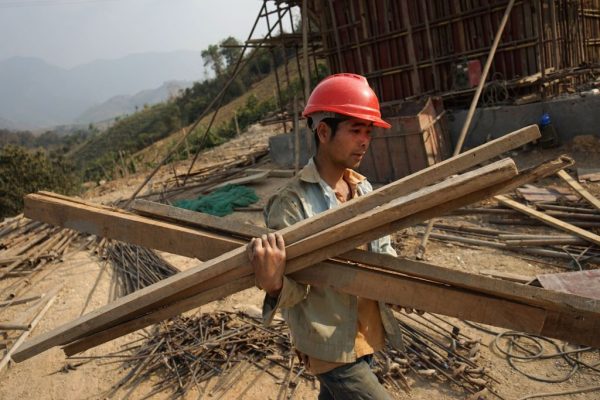On Dec. 7, Italy’s Prime Minister Giorgia Meloni announced that her country would withdraw from China’s Belt and Road Initiative (BRI). The decision reflects growing skepticism about the project’s benefits and raises new concerns over China’s increasing influence in regions like Asia-Pacific, Eastern Europe, and Latin America.
The move by Italy — the only Group of 7 (G7) nation to have joined the trillion-dollar Chinese project — challenges the narrative of the BRI’s global appeal and influence. The G7 countries consist of the world’s largest IMF-described advanced economies, and are made up of Canada, France, Germany, Italy, Japan, the United Kingdom, and the United States.
“I think that we should … improve our cooperation with China on trade, the economy,” said Meloni during a press briefing on Dec. 7, Reuters reports. “The tool of the (BRI) … has not produced the results that were expected,” she added.
Launched by Chinese leader Xi Jinping a decade ago, the BRI aimed to expand China’s geopolitical clout through massive investments in infrastructure across various continents. Yet, despite the project’s grandeur and scale, it has increasingly come under scrutiny for what critics describe as “debt trap diplomacy” — a strategy that experts say leave smaller nations burdened with unsustainable debts.
MORE ON THE BRI:
- China’s Belt and Road Initiative Under Scrutiny Ahead of 10 Year Anniversary
- China’s ‘Belt and Road Initiative’ Falters as Beijing Runs Out of Funding
- Leaders at G7 Summit Take Aim at China’s Belt & Road and Ongoing Russia-Ukraine War
- China Eying Strategically Located Island Nation of Kiribati
The BRI’s ambitious scope, as envisioned by Xi, was to create a network of railways, ports, power plants, and other infrastructure spanning from Southeast Asia to Europe. However, the actual outcomes — particularly for Italy — have not met expectations, said Meloni.
Success
You are now signed up for our newsletter
Success
Check your email to complete sign up
Since the signing of the BRI memorandum of understanding in 2019 by then-Italian Prime Minister Giuseppe Conte, Italy’s trade imbalance with China has only widened — with exports to China marginally increasing and imports nearly doubling. The 5-year deal was due for renewal in March 2024.

Meloni’s critique of the BRI, which she termed “a big mistake” during her electoral campaign, reflects a broader concern: That economic benefits of such international agreements must be equitable and “not disproportionately favor one party.” Italy’s Foreign Minister, Antonio Tajani, echoed this sentiment, stating that the project “has not achieved the desired results,” and emphasized the success of countries that opted not to participate in the BRI.
“The outcomes anticipated from the Chinese initiative haven’t been met, and in fact, nations that abstained from participating have had better results,” Tajani told reporters on Dec. 6 during an event hosted by Italian news agency Adnkronos in Rome. Despite the remarks, however, Tajani said that Italy’s decision to exit the BRI “would not negatively impact” its diplomatic ties with China.
‘Debt trap diplomacy’
Italy’s withdrawal comes at a time when Western countries — particularly the G-7 — are presenting alternative global infrastructure programs to counter the influence of the BRI. The pivot by Italy could signal a larger trend among Western nations to reassess their involvement in Chinese-led initiatives, seeking to balance economic opportunities with national security and geopolitical considerations.
“We think there is increasing convergence, both at the G7 and at NATO, around the challenge China poses and around the need — the urgent need for consultation and especially alignment among the world’s leading market democracies to deal with some of those challenges,” U.S. National Security Advisor Jake Sullivan said during last year’s G7 Summit held in Germany.
RELATED: Awaiting Extradition, Chinese Billionaire Alleges Deep Fraud in CCP’s Belt and Road Initiative
China’s response to Italy’s exit — while not directly acknowledging it — highlights tensions surrounding the BRI in an international landscape. Chinese Foreign Ministry spokesperson Wang Wenbin’s comments about opposing attempts to “smear and sabotage Belt and Road cooperation” indicate Beijing’s sensitivity to the changing perceptions of its flagship project.
Shifting dynamics
At the heart of Italy’s decision lies a deeper narrative about the changing dynamics of international relations, experts note. The BRI, once hailed by Xi as “a project of the century,” is increasingly viewed with skepticism, as exemplified by the plight of countries like Sri Lanka, which had to hand over strategic assets to China due to untenable debt.
According to a report from Italy’s Council on Foreign Relations, the country’s decision to join the BRI in 2019 was initially driven by a “desire to attract investment and expand its market access” in China. However, the anticipated economic benefits did not materialize. Since joining the BRI, Italy’s exports to China increased only marginally, while Chinese exports to Italy grew more dramatically.
Giuliano Noci, director at the Politecnico di Milano university, further pointed out that the “lack of side deals” that could have granted Italian products better access to the Chinese market was never proportionate under the partnership.
In fact, Chinese investment in non-BRI countries in Europe outstripped its investments in Italy — indicating that joining the BRI did not necessarily guarantee special status with China on more trade and investment opportunities, Noci pointed out.
But Italy’s withdrawal from the project poses its own challenges, Lorenzo Codogno, chief economist at the Italian Ministry of Economy and Finance told Italian news site Formiche. “The challenge [Prime Minister Giorgia] Meloni faces is how to move out of the BRI, which is a political and not an economic tool, while maintaining or strengthening economic links with China.”















